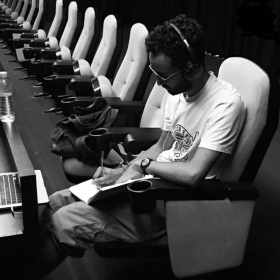The internet is perhaps one of the greatest tools humans have ever created. Never has something provided such opportunity, helped so many, and allowed such breadth of communication.
However, one person found that the increase in our methods of communication has adversely impacted our ability to communicate. Words that once had defined meaning have now become mutated and inert, and used for arguments rather than discussion.
Museum of Dead Words
After having noticed that he could no longer have conversations that contained certain words because there was no longer a shared understanding of what those words meant, Brian 'Dyalekt' Kushner - musician and performance artist - spent a year trawling through internet comments and identified 11 words that have been lost to the cacophony of internet buzz.
So roll up one and all to take a ticket and enter the curated tour of the Museum of Dead Words, the resting place for 11 of the most abused and neglected words. Stripped of meaning and integrity, they are hung up in their finest fonts for us to reminisce.
Dressed in a top hat and corduroy coat, ruffled shirt and dungarees, Dyalekt adopts the role of museum curator and starting proceedings with health and safety announcements. He also suggests that his manager likes him to stick to the script - that he handily has written out.
The words in question?
Hypocrite; Deserve; Clickbait; Obvious/ly; Normal; Truth; Miscegenation; Racist/m; Slut; Sexist/m; Evil.
Demonstrating exceptional domination and control over the English language through both speech and rap, this sharp tongued tour guide is well-suited for taking us through the eulogy of bad words. This was as much music as theatre, and the social commentary mixed the two with reasonable success.
What I found to be particularly successful was his enthusiasm to dive headfirst into the issues surrounding the power of language, and the societal impact those words have. Systemic issues such as sexism and racism aren't shied away from here, and Dyalekt takes an almost satirical look at them.
I particularly enjoyed his take on the issue surrounding truth, or rather the complete rejection of truth in favour of "head cannon". He criticised the idea of having a personal truth - how can you take ownership of something that is meant to be collective? The moment it becomes personal, it becomes nothing more than gossip and perspective.
The cause of death for obvious and obviously is in part a result of this mutation of the truth. Dyalekt makes the great point that nothing can be obvious if we lack a shared understanding of the subject matter. If everything is head cannon, or down to personal interpretation, what if obvious for one can no longer be obvious to all.
Room for improvement
Though his carefully curated concept and command of the English language was always on point, his occasional struggle to verbally articulate held him back. The rap element to the show drove it. encouraging engagement across all interests, ages and contexts, it was the performic crux. It was therefore difficult to watch him stumble over the fast-paced, sharp-tongued lyrics and this drawback distracted the before captivated audience from the overall concept and therefore the piece itself.
However, the biggest obstacle Dyalekt faced, and indeed what I think perhaps slightly undermined his performance, was the actual space he itself. The deceased words were suspended on walls (and coffee bars) around the room, but the layout of the chairs were set up for a presentation, requiring the audience to either crane their neck or rotate their chairs. The layout of the room also impacted the sound to an extent, with speakers better suited for carrying conversation than music and rap.
Nonetheless, the quality of the show, and the underlying messages still shone through. The idea that words don't have meaning until we give them power was a significant one. It correctly identifies that we need to be more careful with the words that we use, while simultaneously not being over-sensitive.
"Define yourself by what you do, not what you feel in your heart."
For more information, visit dyalekt.com
Sally Trivett contributed to this piece











Liking the "clickbait" title of this blog